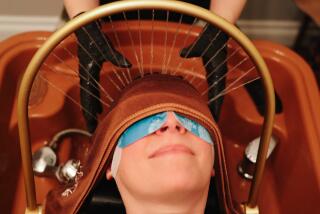Mothers Take Tip From Hippocrates for Their Infants and Toddlers : Health: Classes teach parents about the physical and emotional benefits of massage for their little ones.
Though her pediatrician wasn’t worried, Sue Spackman was coming unglued. Her colicky 3-month-old daughter, Julia, would cry for hours.
Spackman stopped drinking milk, changed her diet and read all the literature. But what finally helped, she says, was something Hippocrates recommended 2,000 years ago: massage.
“When a baby cries, there’s an escalation of frantic energy that seems to feed on itself,” said Spackman, a first-time mother from Hermosa Beach. “I’m not saying massage is a cure, but it helps relieve the tension in Julia’s tummy, and it helps us both be more calm.”
Spackman is among the mothers, nurses and grandparents discovering the physical and emotional benefits of massage for infants and toddlers through a class funded by the Beach Cities Health District and offered by the private nonprofit agency Prototypes/Generations. The agency provides services for women and their families.
On a rainy Monday morning, moms and tots cocoon in a cozy room at the South Bay Hospital. They are surrounded by bright red and yellow pads, oversized pillows and bottles of vegetable oil.
With soft, tanned hands, instructor Elise Asch starts the class by demonstrating leg and foot massage on a toddler-sized doll.
“Holding the foot in one hand, with the other palm go up and around the hip joint and come down lightly,” explains Asch, 65, a Manhattan Beach grandmother. “The key word here is slow. If you both relax, it will be a pleasurable experience.”
With 30 years of experience in massage therapy and a degree in early childhood development, Asch is authoritative and empathetic. She makes the motions look effortless.
Two-year-old Cory has had enough of his mother’s leg kneading and dumps the contents of her purse onto the floor. “Cory, would you like some oil on your hands? Come here and get some oil,” Asch says gently. With the toddler happily massaging a doll, she continues. “You want to make eye contact. Keep their heads elevated. Talk to your child or sing to them to keep their attention. You will find a time when they will lie down. We don’t expect it to happen here.”
For Asch, massage is a way to cement the parent-child bond and build feelings of security in infants and young children and self-confidence in parents.
Experts say that massage helps improve the function of babies’ respiratory, circulatory, digestive and nervous systems. And studies have shown that massage stimulates weight gain as well as development of mental and motor skills in premature babies.
It was Asch’s experience teaching massage to mothers of premature, cocaine-exposed babies that inspired her current classes.
In addition to teaching massage, Asch and assistant Janice O’Neal lead a discussion session where parents can share experiences. “Most of the mothers are frantic because of the world in which we live, and as a result the babies are frantic, too,” said Asch. “We want to help parents become aware of things they loved growing up and things they don’t want to repeat with their own kids. And we want to help them think about how they want to handle certain parenting situations, rather than just reacting.”
Cherubic Kiley Swaine, age 16 months, rubs his eyes and yawns as his mother, Gay, gently strokes his legs and shares her mixed emotions about joining a local church. The theme of religion strikes a chord with the two other mothers; Marianne Jew and Alida Higgins. After just the first class, the three women have forged a connection. And over apple juice and toys, their sons are socializing, too.
Twice a week, Asch takes her massage therapy to the parents of developmentally disabled infants and toddlers at the Jefferson School in Redondo Beach. For many of the parents whose babies require physical therapy, the gentler massage represents a more fun experience.
Asch has seen major changes in some of the developmentally disabled children in her classes. Like the 8-month-old boy who wailed and refused to lie on his back. By respecting his wishes, Asch and the mother were literally able to turn him around. Within two weeks, he was voluntarily lying on his back, enjoying a 40-minute massage from his mother.
The length of the massage session should be determined by the baby, Asch stresses. And parents should experiment to find the best time of the day for the massage. Sometimes, catching an infant right before a cranky period can stave off tantrums. For Dori Jenks of Redondo Beach, the ideal massage time is evening. That’s when her 13-month-old daughter, Hallie, gets so relaxed that she occasionally nods off in the middle of their session. For this mother and daughter pair, massage has turned the trauma of bedtime into a relaxing ritual.
And as Hallie becomes more independent, Jenks is finding that massage helps them reconnect. On Mother’s Day when Jenks’ back was hurting and she asked her husband to work on her muscles, along came little Hallie with a bottle of oil, offering to help.
“In a society in which raising children is largely devalued, it is wonderful to have a community offer a free program where the demands of motherhood are acknowledged,” Jenks said. The Infant and Toddler Massage and Exercise Program is offered at no cost to those living or working in Hermosa Beach, Manhattan Beach and Redondo Beach. For information, call Prototypes/Generations at (310) 798-7126.


